
E2open’s Ocean Shipping Index reveals 70-day average to ship freight globally.
“Ocean transportation is the backbone for world’s largest supply chains and critical to the flow of goods that power global economies,” says Pawan Joshi, EVP of products and strategy at E2open. “Successful operations require an accurate understanding of how long it takes to ship freight, especially for just-in-time supply chains. Detailed understanding of the time required for containers to arrive at the port, clear customs and be ready for pick up by ground carriers is the key to streamlining port operations and decongesting logistics operations. Transportation volatility – driven by high demand, container shortages and port congestion – has made historical lead times unreliable, increasing the risks of disruption in downstream production and customer service. Among other things, this quarterly index provides a new level of visibility so that shippers can better understand when to book capacity for goods to arrive at the required date.”
From BusinessWire:
- Overall, lead times have steadily increased across all lanes during the last 12 months, requiring shippers to budget more time for transporting goods.
- In the third calendar quarter of 2021, the average global shipment took 12 more days, or 23% longer, than the same period last year.
- The two most significant factors were a rise in time between the booking to gate in at the port, up 43%; and the ocean transit time, up 36%.
- Overall lead times from North America to Asia took 17 days longer than from Asia to North America, or 25% longer.




















